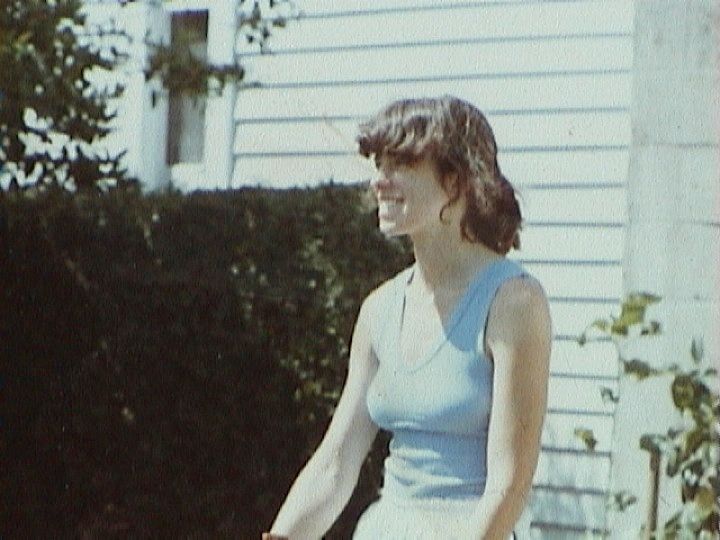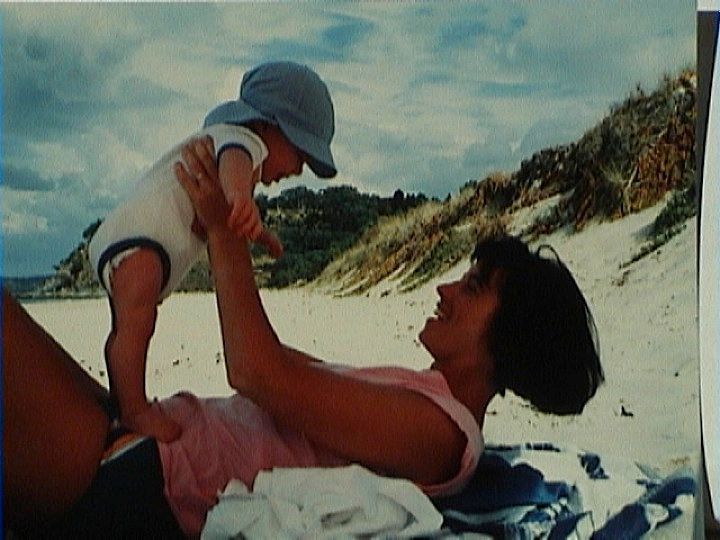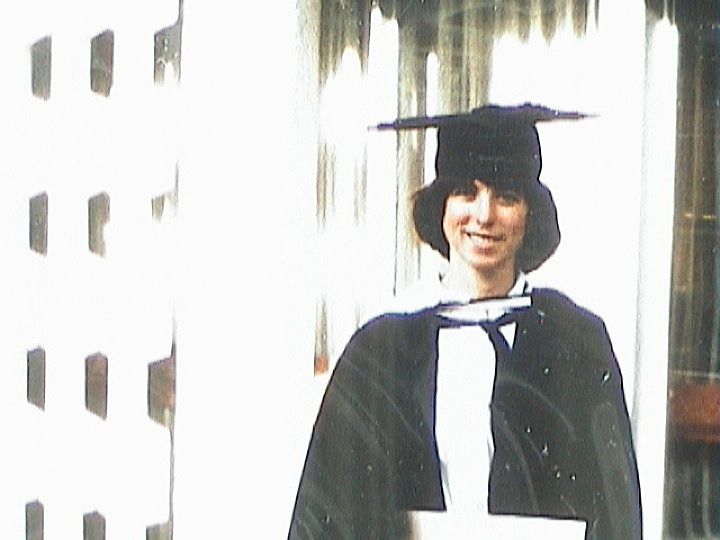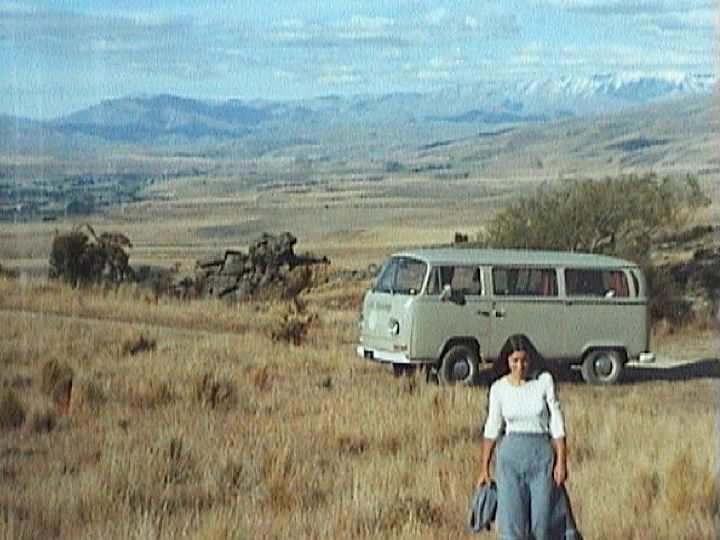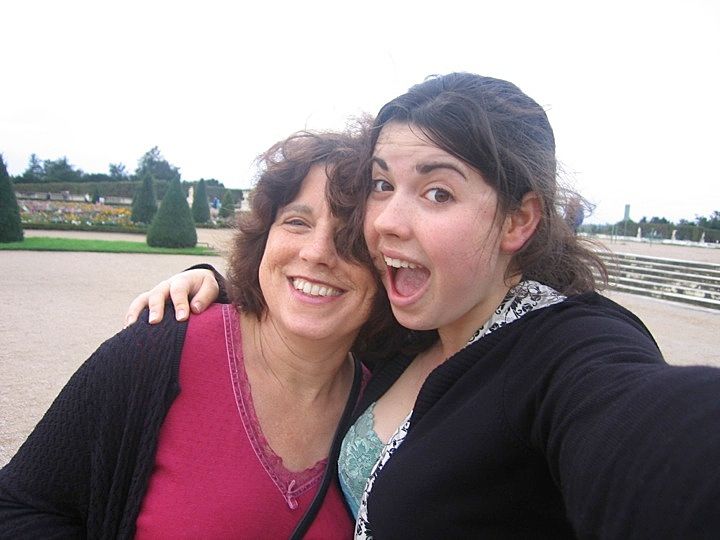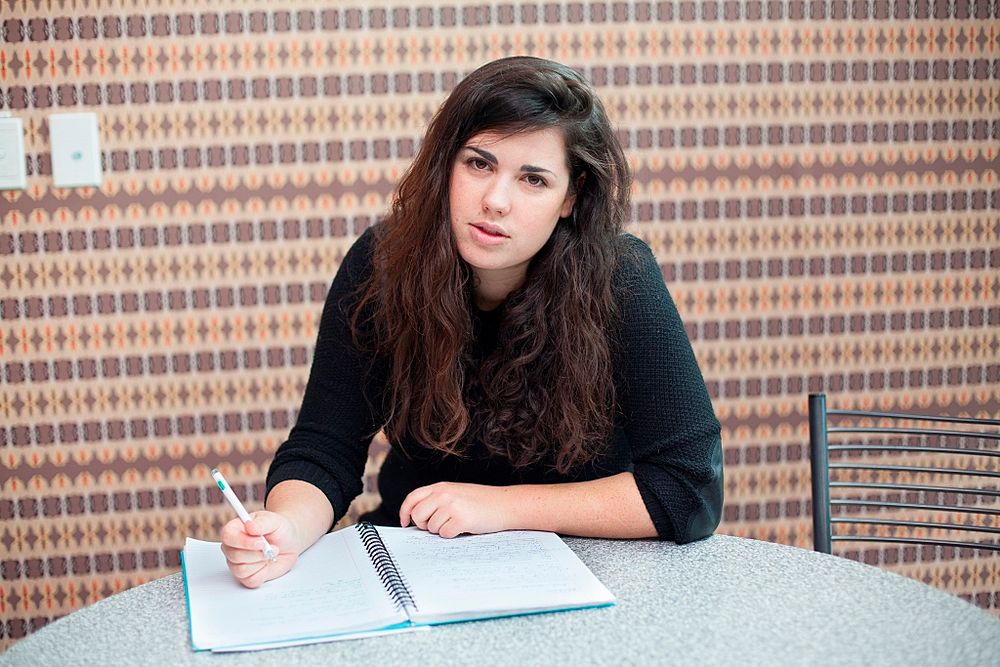The Threshold
One week ago, the letter arrived in the post. I’m three days away from discovering whether or not I’ve inherited the gene mutation that caused my mother’s cancer, and I’m terrified.
In the last months of my mother’s life, I fell into the first blushes of what I thought, at the time, was love. Chris was nine years older than me, could fix cars and had a crooked nose that listed to the right. The most romantic moment of my life was when he danced with me in the living room of my empty childhood home. Mum was in the hospice and the mauve carpet was stained with blue curacao from turbulent teenage cocktail parties, but Chris and I played Van Morrison on the stereo and he looked at me like it meant something as he swayed his hips closer and closer to mine.
When Mum was in that antiseptic, white-walled place, we would push the downstairs couches together to form a trough in which to sleep and spoon. But when she was home we slept in my single bed, in some kind of improbable effort to conceal the fact that there were two of us. I was skinny then, waning with the effort of maintaining my mother’s life, sick with the knowledge that she was leaving. So we fit, just, but I struggled to sleep through the closeness his snoring, and didn’t want to press myself too tightly to his back hair.
Mum would ask me where he slept. I would always say the couch. I would say it through the gritted teeth that ground against each other as I recalled the year prior, when I listened to my brother grunt and groan, echoing his first girlfriend at all hours of the day. My brother’s burgeoning sexuality was beheld as endearing and natural; mine as improper and wrong.
I never felt that Mum wanted to cling to my youth, or her little girl. I thought she wanted me to love someone better. Chris was a good man. But despite our shared nights, he didn’t come to Mum’s funeral. I thought for a long time that the singular cell left in her that was still mother, not cancer nor morphine, already knew he wouldn’t be there when it came.
I didn’t realize how strange it must have been for Mum to hear us talking about life without her in it. Or how much it must have hurt to watch beginnings, when endings were all she had left. Occasionally I would mention my plans to return to Scotland, where I had spent a few happy months during her remission. She had to do the hard work of dying, yes, but I became more and more aware of the need to lay plans in light of the job that lay ahead: living, without her.
When I raised the subject, she shook her head gently, begging me to stop. I continued. I was trying to offer her a memory of something that hadn’t yet happened, so that when it did, she could still be a part of it. But solipsism is intrinsic to humanity - we cannot comprehend that which we are not. A world in which we are dead is, to us, nonexistent.
The hospice was framed by plane trees. The thick, bleached trunks had been growing since the place had been a nunnery. I remember them seeming unfeasibly tall. But then many of my recollections of the good moments amid the sadness have taken on fairy-tale qualities: the leaves fell like hot air balloons; the sun was melted butter; my mother was perfect.
Even the twenty-meter journey from her room to the carved wooden memorial benches was a wild adventure - Mum in her wheelchair, eggshell-fragile, being slogged across the rugged terrain of the manicured lawns. It doesn’t really make sense how unstable the earth seemed. But then neither did the translucency of her skin as she held her doe-face up to the light. I would ask Chris to push her, though I was strong enough. He would park her by a bench, sit down, and talk to her about motorcycles, which she rode in her youth.
When Chris walked through the hospice halls I could see how gritty his faded green t-shirt looked against the stark blankness of the sterile environment. He washed his hair with soap, not shampoo, and sometimes I could see its remnants glued to his follicles. He would kiss me on the forehead when he arrived in the evening, because the lights were fluorescent and too bright against the fading day outdoors. There was something about lips against all that knowing that seemed wrong.
On the last Friday night Mum ever had, I was sitting in the corner of her room, knitting while she slept. She opened her eyes and smiled at me, curled within myself in the vastness of her therapeutic chair.
“Where’s Chris?” she asked.
“He’s at home or something. Not sure.”
“Will he stay with you tonight?”
Mum died the next day. I knew that she would. It was time. So I didn’t lie.
“Yeah, I think he’s coming over later. It’s scary in the house alone.”
“I’m glad,” she said. “I like knowing that you have someone.”
I never watched my mother grieve her life. I only saw her fight for it, until those last weeks of a gentle release. But I wonder what it felt like on the nights when we had gone home. To watch my brother and his girlfriend go back to their apartment, draped about each other’s frames like clothes upon the broomstick bones of a scarecrow. To see me billow in from the outdoors, flush with wind and stories, damp with rain she couldn’t hear through the concrete walls.
We are told, endlessly, that people reach a point when they’re ready to go. I think there is a difference between being ready to stop battling your body in a war you cannot win, and accepting that you’ll never watch your daughter walk down the aisle or graduate. Mum would never hold a grandchild. She would never clutch my baby girl’s hand and walk along the edge of the ocean, marveling at the perfection of her sticky ringlets.
And I wonder if she looked at Chris and remembered the shuffle of confused bodies learning themselves in tandem: the ache of each other. I think she saw in Chris all the things she could never have again. She saw every part of my life she would miss, and though she was thankful that I wouldn’t be alone, it was simply too much for her to imagine us bridging so many divides in a single bed, at night.
One week ago, the letter arrived in the post. I’m three days away from discovering whether or not I’ve inherited the gene mutation that caused my mother’s cancer, and I’m terrified.
If I am a carrier of the BRCA1 mutation, then decisions must be made. About organs and timelines, children and reconstruction and the constant screening I recall from my mother’s remission, only without the pre existing disease.
The whole family could have the mutation, but it’s worse for women. It results in around an 87% chance of developing breast cancer and a 60% chance of ovarian cancer. Many carriers choose to have their breasts and ovaries removed.
I’m the only woman in the family that could be affected -- the only one whose life is held in the limbo of an unanswered question -- and there’s something very lonely about that. But it’s the waiting, for now, that is the worst part. I’m afraid of the implication of death, certainly, but much more scared of the anticipated battle. In the same way, I fear sharks – not death by shark but bite by shark: the ensuing blood and the fatigue of obtaining the shore. And I’m not afraid of falling, rather the sensation of slipping and the knowledge of impending pain. Some things hurt more before they have the chance to be felt. I like journeys more than destinations and, conversely, fear battlefields more than resting places.
The letter says that the appointment will take around an hour. When I call to confirm, the woman is excessively kind and I am overcome with the conviction that she knows something I don’t. She may already pity me or be laughing at my fear; she is somehow engaged in a fight that I am not yet armored for.
So I spend hours researching breast reconstruction and, in turn, staring at my own in the mirror. I always hated the slack little things, with nipples that refuse to stand to attention on demand. But now I am faced with the prospect of their loss.
They’re rosy and gentle, really. I don’t want to imagine them severed before anyone gets a good look. I tend to be naked only in the dark. It’s an esteem thing. I realize, now, that I want someone to know me in intimate detail. To think about my breasts. To know their weight in a cupped palm. What this really means is that I want to be loved before I am less of myself; I want a co-mourner for what I must sacrifice if I want to live. And I do.
If I am genetically predisposed to an early end, love becomes a more imminent imperative. Those without an always must redefine forever. I don’t know what it means to cease imagining that which I have constantly believed in: those sticky, ringlet-bearing children, a grey-haired husband wheezing up a mountain, a lot of space, a home and a garden. A seat by the fire. A good death.
After my mother’s death, I did her makeup. It wasn’t a task I chose, as such – my uncle said something to the funeral director about wanting her to look natural, and eventually the onus fell on me to make it happen. Her skin felt slightly papery to the touch and her lips were glued together, because that same uncle said we wanted her to be smiling. Benevolent and blushing in the coffin.
I did make her look beautiful. I remember being astounded by the power of bronzer on a ghost-white face. I didn’t know how to fix her hair, which was a thin, wiry, post-chemo down. I rubbed moisturizer between my hands and ran them across the frizz, which left an oily residue. It didn’t really matter. To me anyway. Because that was the last time I saw her.
I didn’t need to look on that body again. My father wanted the three of us, my brother, my dad and I, to go and sit with her as a family. I chose not to. The intimacy of this last gentle act, doing my Mum’s makeup as I had always done, was the only way I wanted to say goodbye to her bones, her skin.
It’s almost eight years since I lost my mother, the person I loved the most. I don’t tend to think about her body anymore, except in relation to mine. Because now her body – ash in a grey plastic brick, atop a cabinet in our family beach house – lingers even longer than her life. In my veins. Maybe. In my blood. Her body was faulty. It gave her cancer. And it made me.
Mum and I existed for most of our shared life as a team. Despite discrepancies in our ability to be kind to one another, it was right that I should be the one to decide on the final face she presented to the world. Years earlier, I remember straightening her hair and making her up for photos on her internet dating profile, and her wonder at what dedicated years of America’s Next Top Model fandom had taught me.
Sometimes I would look at my mum in the black mirror of our kitchen window at night, my face slotted into her shoulder, and burn with my jealousy of her beauty. I remember the last high school event I was involved in, a night of poetry, which I hosted. My mother was late as always, but when I saw her I was astounded by how pretty she really was. It shouldn’t matter, but it did. I was so proud to be hers.
As I did my mother’s makeup I tried very hard to be gentle. Because it seems like a body devoid of a person is a very delicate thing. Despite its lack of what I thought was innately her, that body was still the thing that bore me. I had lived within it, once, and beside it for all of my forever.
The thing about bodies is that they almost defy the clichés they conform to: you don’t hold someone’s soul. You are held by their arms. Eight years after breaking up with my first almost-love, I still think occasionally of his lanky form and the weight of it around me. I would almost like him to snore next to me again, if only to know that it happened.
Memory is too intangible to be rendered in the dimensions I need to call something ‘life’. These eight years have made my mother’s body the most absent thing: the sound of her voice, her hair on the wind and that potential of her hand around my child’s hand.
The day before Mum’s funeral, alone in my house, I slid down the kitchen cabinets and clutched at my ribs as I waited for the kettle to boil. I had laid out two cups, to make tea for both of us, as was my habit. I saw the void of her and it felt like something in my chest was being stretched and pulled beyond measure. I missed her with a sort of breathlessness that I now know as anxiety and, much like a panic attack, its inability to render me lifeless myself was inconceivable.
When writing my mother’s death notice, the funeral director insisted on “surrounded by family.” In reality it was just my Gran and I. My brother went home for a sandwich and I’ve always struggled to forgive that.
Regardless, it didn’t strike me as a crucial inclusion. It was less a half-truth, more a platitude. She died in pain, with my grandmother stroking her hair. Her breath was laboured and rattling with fluid. I said the words I had rehearsed, internally, during much of the preceding week. They sounded childish and derivative.
I sort of wish we sang for her but I would have been embarrassed – we loved hard but self-consciously, without much outbreak or dialogue. So when I told her I loved her, and that she was the best mum in the world; when I reached for her, crying like I was in the kind of pain people call out for, I was also blushing with the extent of my emotion.
My grandmother seemed to allow a sort of surrender in her response. Gran has hard hands. I know because all my life I’ve rested my head on her lap and she has moved her fingers through my hair with intent, like a bough through a sawmill. She’s the kind of Gran who rubs your feet but it’s never gentle, and when she tugged at my toes I recalled her pulling the heads from baby sparrows that roosted in our chicken hutches; a burgeoning generation of pellet-thieves that needed to be culled at the quick.
“You’ve done so well, my darling,” Gran said to Mum. And that mortified me too. I was so embarrassed by the limit to what we could give, flat words and empty invitations. I told her she could ‘go,’ but that was for me. I’m not sure the dying need our permission to leave us. They will go anyway.
Death’s rituals, and most of its language, are for the living. “Letting go”. Funerals. Scattering ashes on a grey coast, out into the sea. As a family we are staunch atheists, though my mother began to believe in something towards the end. We grieve psychologically; systemically. Not for her, but for us.
My grandfather was able to reach for my hand as I told him I loved him on his final night, but my mum was skeletal, grey and unseeing, gasping for breath.
I do continue to wonder if she practiced. I wonder if she imagined that moment. Then her funeral. Her body, just a body. I wonder if she hated being left at the hospice because without us and without her home around her she was just in a corridor, waiting in a quiet line for the end.
My choice for our prepaid slot in the newspaper was a John Masefield quote. “A quiet sleep, and a sweet dream, when the long trick’s over.” My family didn’t love it. They each placed their own classifieds, listing the people who mourned her. I found this inherently egotistic. I wanted to talk about who she was, rather than all the people that she left.
I like Masefield’s idea of life as a trick you outwit by exiting. I also like knowing that so many people tried to pray for her, but she died anyway. The cynic in me believes that life is just a persistent illusion; death is a gentle end to the fiction without reprieve.
The rest of Masefield’s poem, Sea Fever, is true too. All my mother really wanted were the tools for adventure. The ocean, a tall ship and the stars. She wanted to be needed the way the waves and the shore swell with each other and she wanted to exist beyond her final chapter.
She does. I don’t believe what she began to believe, in ghosts and channels to swim back to the living. If that were true, she would have come back for me. No one can love like we did and fail in the final act, and so the curtain fell on her life when science said it did. She is a story now, and a wish – just one of the endless, endless mothers who are gone.
I don’t like the idea of silver linings but I do hope I’m open to learning. And the one thing I’ve learned from my time at the fringes of the medical world is that we all want to live, despite the evidence that we all die in the end. We want to fight death despite its inevitability. We talk about literary canons because we know we won’t live long enough to read everything and that, too, is an effort at immortality: I’ve done enough. I’ve filled a quota. I am complete.
So we break world records despite their irrelevance and we poison people with chemotherapy just to give them a little more of the time they were always expecting. I might cut off my breasts for that time. I might pull out my organs for those hours, and I will use those hours to try to build that most selfish thing: a legacy.
The genetic counsellor asks me if I have any questions before we begin. There’s a man in the corner learning the job; I can see his eagerness as he chimes in with gentle words and support. I say no. I just want to know.
And the result is negative.
I have not inherited the BRCA1 mutation. Like everyone, I could get cancer. But my risk is the same as all my friends with living mothers; the same as the population who, I imagine, are vaguely concerned about acquiring the disease, but without the fixation that has dominated my thoughts since my mother’s diagnosis more than ten years ago.
This, it seems, is where the story ends. I text my father to tell him the good news and he replies “Whalen genes rule.” I am not as much my mother’s likeness as I thought I was. Maybe our journey was really only hers. I can log off the BRCA1 message boards. I can stop thinking about surgery and reconstruction and stop applying time limits to this great void that suddenly appears before me.
I am happy. I have to be. But I’ve been kicked out of the cancer club, and it feels worse than it should. For ten years, my identity has been warped by the false knowledge that this would be mine too; that this was an inherited burden. I felt brave when Angelina Jolie wrote about her post-BRCA1-results surgery. Now I feel foolish. My battle is over. I can lay down my sword. Like everyone else, I am in the hands of chance. There is no validity to my sense of disconnect from a body I thought was ready to betray me. These organs are mine, and unaffected.
It seems I’m not the first to doubt and fear this answer. The genetic counselor is incredibly understanding and stresses that I can have the test again if I want to, or another appointment to hear the words a second time. She says all these feelings are normal. She says survivor’s guilt is real. She reaches for me when I leave, as if for a hug that I turn sideways to and avoid.
I have a fair amount of faith in the system, and I am sure they didn’t mislabel my blood tube. But another appointment, another test, sounds tempting. I don’t want this to be the last time I get to talk about my mother. There was some catharsis in being able to cry about her disease all these years later, and its associated fear. There was huge relief in feeling validity in my terror, and in an ache that has lessened since her death, but will never dull entirely.
Loss is physical, and I think I believed mine would transition from a pain in my chest into the blossom of a tumor. I think maybe I wanted Mum’s absence to be transubstantiated as the removal of my organs, to understand her better while suffering as she suffered.
And part of me, if I’m honest, wanted to tell the story. I wanted to be brave and to be lauded for it. I wanted a narrative arc to this grief I just can’t shake.
I imagined that testing positive for the mutation would hold some relief; some answer to the hysteria that settled deep in my bones the day my mother was diagnosed: this is mine too. I was dying too, somehow, of this same disease. It’s in my blood; it always was.
So when I lay beside her in the hospital bed, when I held her hand as her belly was drained of fluid with an eight-inch needle; when I picked her up off the bathroom floor and rinsed her of her own blood, I was just practicing. When I went shopping for giant bras as she swelled with medication and carried her up the stairs when she was as thin as a shadow; when the attendant on the oncology ward taught me how to parallel park through our daily visits to the cramped square of asphalt outside and when I stood in the hospital’s wind tunnel, gasping, it was a grand dress rehearsal for the moment my own flimsy flesh took the stage.
I knew where the tea bags would be on the ward. I knew which cupboard housed the gin in the hospice. I knew which shade of pink looks best on a dying person and I knew how to say goodbye. How do I sever myself from the spaces I prepared myself to consider a sort of home? I’ve learned how to live on a limited timeline – so now what do I do with all these years I’m more likely to have?
Should I stop living so hard? Should I stop seeking danger and solitude in impossible places? Maybe I don’t want to have kids as desperately as I thought. Maybe I desire a different kind of man. I thought I wanted one who would weather the storm and love me through the worst, with a positive attitude and incredible solo-parenting skills, readied for my demise. I love the partner I now have very, very much. It's the weight of this news that makes me question everything.
Or maybe none of this is true, and within weeks this news will ring like a breakup. It happened, it was hard, but I moved on. My story will change. The box I place about the fiction of years will alter and grow. I’ll learn to love my breasts and I’ll cut my hair short without fear, because I’m not certain that one day I’ll lose it all. I’ll get health insurance at a lower premium and in the world of genetics I’ll be one of the lucky ones, who took the news well and walked away into the long life denied to so many.
There are no support groups for my BRCA1-less crew, and why should there be? We are the survivors. The ballot has been drawn, and we’re not headed for war. While our siblings have their heads shaved and their pajamas issued; their beds folded tight into hospital corners and their weapons and veins greased for combat, we’re just standing on the sidelines, waving a long goodbye.
I remember the geneticist telling me, in early appointments, how many distant relatives had come forward for testing. I felt a kinship with this family I’ve never really known, and some kind of excitement about connecting through this.
But now we are two camps: positive and negative. Those who belong to the bloodline, and those who don’t. I thought I was one of them. I thought I was my mother’s daughter, through and through.
But we are the stars of our own plays; we are the carriers of our own genes. I thought my next act was cancer. And I should be honoured to re-write the scene. Sickness is what I have lived, vicariously. I’ve always been told to write what I know.
What do I write for myself now?
When I was eighteen my car was towed from a potholed lot in central Auckland. I misread a sign and it was my fault, though the tow truck operator was needlessly rude and his aggression resulted in a policewoman accompanying me to retrieve my little vehicle.
I remained stoic throughout the ordeal, despite being somewhat terrified and completely mortified. I returned home, tail between legs, and consulted Mum in her bedroom. It was only a few months before she died. I remember that she spoke in the quiet voice she faded into, in those last months.
“It’s fine though,” I said to her. “I’ll get over it.”
“You can’t get over it until you feel it,” Mum replied.
I paid a fee and retrieved my car. I took a test and retrieved my longevity. I do have the capacity to be brave and indifferent. It’s a kind of power, but it’s one bred of the anger that protects a heavy heart.
The kind of courage my mum had – the kind of courage I hope I inherited – is honest. Maybe she didn’t fight her disease, but lived her best through it, until its end. For her funeral she wrote that she saw herself as a caterpillar, slogging away at getting all the nutrition and care she needed, ready for the next stage. And she believed that she would either emerge as a butterfly -- healthy, better, and irreversibly changed -- or as a soul, finally free.
She also wrote of how proud she was of my brother and I. She said that we were the loves of her life. And this, in particular, is what I see as courageous. My mother didn’t wish for more, she just stuck herself hard to all that she had.
Some part of me sees what my mother achieved in her life as some kind of failure: no successful relationship, no illustrious career, not a whole lot of money, no halls of fame. And yet when she was dying, it was only her kids, her family and her close friends that she craved. She wanted to eat nice food and watch sappy DVDs; to celebrate Christmas, give gifts and sit in the sunshine. It should be enough.
There is so much rhetoric around living and dying. It’s an industry. It’s the great war of the modern West. And it’s confusing, because to cheat death, as it seems I have done, feels so hollow. We’re supposed to go down fighting -- “Do not go gentle into that dark night” -- and yet if asked, most people desire a death equated with peace. No one has ever triumphed over death, and yet to die is apparently to give in.
Conversely, we tend to perceive old age as senility, and think that to fail to remember the people who need you is to become obsolete. When I speak to my grandmother she’s unclear of just who I am. But I hold her hand. I take her to the museum and she reads each information plaque in detail; she falls asleep in her chair each afternoon smiling and she has names for all the goldfish in her pond. My mother cheated senility, and yet was cheated of it.
I’ve lost something too, finding out my genetic results. Cheating feels like the right term, because I’ve both won and been denied something I never earned.
I look at my body, now, and see only bones and flesh. There is no disease looming in my ovaries. My breasts will remain intact.
When I drive past the hospital, past the pods of gowned smokers, I remember standing in the wind tunnel of its entrance, sobbing into the torrents of air that stole my breath. Now, I don’t have to anticipate my own daughter screaming into the wind, fighting this unseen thing in a war against surety. I imagine it anyway.
It hurts to be genetically exempt from my mother’s cancer. It hurts in ways I didn’t expect. It must hurt for others too, and to deny someone’s pain is to silence them. We’re already so limited by language. Pain is a sonic release: a groan; a cry. We have numbers (out of ten) and types (stabbing, aching, throbbing). But there is no true translation of pain. It can’t be transferred. We can’t hurt for someone else.
And that is what I wanted most of all. To take what my mother carried. To hold the thing she couldn’t communicate, deep in my gut.
To know just how it hurt her.
A small portion of this essay was originally published in lip magazine
